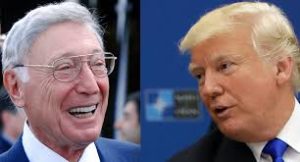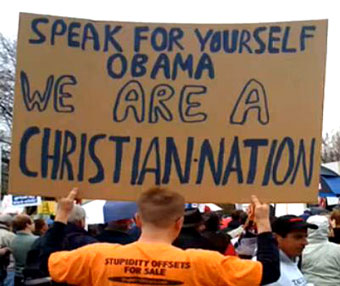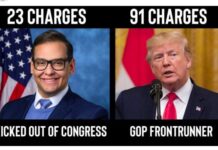Organizations that fight new problems with old ideas are destined to fail. And this is what is happening today as major Jewish organizations fight the rise in anti-Semitism in the Trump era.
The recent report from the ADL that hate crimes against Jews reached an all-time high in 2019 should shock national Jewish organizations into addressing the problem based on today’s new reality.
But the reality is that fighting anti-Semitism in the Trump era is not the same as fighting anti-Semitism in the pre-Trump era. This new reality is that the rise in white supremacist, neo-Nazi groups have links, or derive, their motivation from Trump.
This ideological connection between Trump, and white supremacists have existed since before Trump began his presidential campaign. It is well-known and documented, yet this emotional and ideological attraction has largely gone unnoticed, at least in their public statements, by the nation’s largest Jewish groups fighting anti-Semitism.
But it’s certainly no secret among Republicans. In August 2019, a Republican state senator from Nebraska accused the GOP of helping to enable white supremacy, according to The Hill. “The Republican Party is enabling white supremacy in our country,” Nebraska state Sen. John McCollister (R) tweeted.
“As a lifelong Republican, it pains me to say this, but it’s the truth,” McCollister continued. “I, of course, am not suggesting that all Republicans are white supremacists nor am I saying that the average Republican is even racist. What I am saying though is that the Republican Party is COMPLICIT to obvious racist and immoral activity inside our party.”
Similarly, an article in The Nation found that “there are Republicans who know that this president’s [racist and white supremacist] provocations have been harmful. But they have muted their disagreement for reasons of even cruder partisanship rooted in the fear of primary challenges, and of losing favor with party leaders who have become Trump’s enforcers.”
As recently as May 2020, Trump visited a Ford car facility where he praised Henry Ford’s “good bloodlines.” This odd comment prompted Stosh Cotler, CEO of Bend the Arc: Jewish Action, to comment that “Make no mistake,

President Trump knew exactly what he was doing when he said one of America’s most notorious anti-Semites has ‘good bloodlines.'” Cotler Tweeted that “Hitler’s praise for Ford. – a dog-whistle to anti-Semites & white nationalists.”
An NPR article quoted former Trump economic advisor Gary Cohen as saying the Trump administration “can and must do better” in condemning racism and anti-Semitism. Cohen made the comments after Trump hedged his criticism of neo-Nazis and Klansmen who marched in Charlottesville, Va., where one anti-white supremacist was killed.
In response to this, Cohen said: “Citizens standing up for equality and freedom can never be equated with white supremacists, neo-Nazis, and the KKK. I believe this administration can and must do better in consistently and unequivocally condemning these groups and do everything we can to heal the deep divisions that exist in our communities. As a Jewish American, I will not allow neo-Nazis ranting “Jews will not replace us” to cause this Jew to leave his job.”
And most prescient, the Jewish Democratic Council of America said in 2019 that “the biggest threat to the security of American Jews today is, incredibly, the president of the United States.”
A Myopic Response to the Problem
Today, national Jewish groups hold seminars, educational efforts and raise funds to combat antisemitism. But their presentations and programs are based on an obsolete assumption. That assumption is that Trump has a modest, or no, connection to the problem they are addressing. This is blatantly false. Trump is a direct engine to promoting antisemitism based on news reports and data from the ADL and the Southern Poverty Law Center, two groups with the most complete lists of events tied to religious and racial hatred.
Most recently, the number of violent incidents by white nationalist hate groups in the US have increased 55% throughout the Trump era, according to a new report by the Southern Poverty Law Center (SPLC). The SPLC has identified 155 groups in 2019, that “were counted separately from Ku Klux Klan groups, racist skinheads, Christian Identity groups, and neo-Confederate groups, all of which also express some version of white supremacist beliefs,” according to a report in The Guardian.
The latest ADL study found a nearly 123% increase in white nationalist propaganda in a single year, surging from 1,214 incidents in 2018 to 2,713 in 2019. “This is the highest amount of white supremacy activity that the organization has ever recorded,” the ADL said.
One white nationalist interviewed by the Capital News Service said he believes Trump is a white supremacist because “he uses the same rhetoric” as his group. The white supremacist said Trump “only indirectly supports people like him,” but he also said he reached out to “mid-level officials in the [Trump] administration” who are sympathetic to his group.
“It’s encouraging to hear him call African countries ‘s***holes’ and say now and then that Mexican illegals are criminals and rapists, and sometimes he even utters some truth about the Jew,” the white nationalist said.
Why the Timid Response to Trump’s Connection to White Supremacists?
So why are national Jewish groups derelict when addressing the rise in anti-Semitism in the Trump era?
There are a few reasons. Some are tied to organizational structure, political correctness, and the decision to not offend large donors. Traditionally, national Jewish groups were strictly bipartisan for tax and practical reasons to be the big umbrella to bring in a large membership. The American Jewish Congress, for instance, has 401c3 tax status, which means it must be non-partisan in its operations. While this is a legitimate tax concern, it now has practical limitations.
Political non-partisanship was good organizational behavior in the pre-Trump era. However, in the last few years AIPAC, for instance, was criticized for appearing to tilt pro-Trump as evidenced by some of its attendees and remarks some speakers made from its conference stage. But AIPAC’s unofficial pro-Trump bias is understandably tied to Trump’s pro-Israel positions. AIPAC is a premier lobbying group, but its focus is not combating anti-Semitism. That responsibility falls on other domestically-focused Jewish organizations.
But there is a problem. While many Jewish organizations focus on this issue, they have a blind spot when it comes to linking Trump’s words and actions, direct and indirect, to alt-right groups. Then, there is another connection that should be addressed. This is the link between wealthy Jewish donors to Trump who ignores his relationship, however, disguised, with white supremacist groups.
This is not to say that large Jewish contributors to Trump and the Republican Party are funding white supremacists. There is no evidence of that.
But the money trail raises the question about why large Jewish contributors to Trump are not stipulating that their contributions to Trump are contingent on a more vocal objection to his administration’s white supremacist endorsements and actions.
The best example comes from Sheldon Adelson, who is Trump’s largest single individual contributor. Adelson said he would donate at least $100 million to boost Donald Trump’s 2020 re-election efforts and Republican congressional candidates in 2020, according to an article in The Guardian.
Adelson and others in the Republican Jewish Coalition (RJC) lobbying group have made significant contributions to Trump and the Republican Party. One part of their mission statement says” “We work to sensitize Republican leadership in government and the Party to the concerns and issues of the Jewish community while articulating and advocating Republican ideas and policies within the Jewish community.” The RJC certainly knows that anti-Semitism falls under the “concerns and issues of the Jewish community.”
The RJC has the monetary power to prevent or curtail Trump’s friendly relationship with anti-Semitic groups. This could happen if the donors wanted to use their proven negotiating acumen to obtain concessions for their donations. (The AJC did not respond to a request for information on this issue.)
Asking for a quid pro quo is certainly is not a new concept when it comes to making large political contributions. It is expected behavior. Wealthy businessmen, like those in the AJC, know the quid pro quo process very well. This is entry-level business negotiations. And based on the latest reports from the ADL, the number of anti-Semitic incidents is on the increase. If we go back and check, there may be a direct and embarrassing direct correlation between the increase in contributions from wealthy Jewish donors to the Republican Party and the rise in anti-Semitic incidents.
It’s time for the major national Jewish organizations that track anti-Semitic events to think out-of-the-box and examine new reasons for this increase. In the past, these groups have blamed any increases in anti-Semitism on social media, the poor economy, Zionism, the BDS movement, the opioid epidemic, Arab propaganda, and reprints of the Protocols of the Elders of Zion. While these are valid possible causes, they have existed for years as the level of anti-Semitic events has not reached record levels.
What is new is Trump’s subtle and persistent racial messaging. At the same time, the Jewish Republican donors  to Trump have been largely silent on this issue. Bernie Marcus, the billionaire co-founder of Home Depot, and top donor to President Trump’s presidential campaign in 2016 said he plans to support the Trump during his 2020 re-election bid, the Atlanta Journal–Constitution reported.
to Trump have been largely silent on this issue. Bernie Marcus, the billionaire co-founder of Home Depot, and top donor to President Trump’s presidential campaign in 2016 said he plans to support the Trump during his 2020 re-election bid, the Atlanta Journal–Constitution reported.
Marcus explained that “[Trump] got a businessman’s common-sense approach to most things,” Marcus said. “…Now, do I agree with every move that he makes? No, I don’t. But the truth is he has produced more than anybody else. He has. If we look at this country, I would say that we are better off today than we were eight years ago or six years ago.”
And when asked to comment on Trump’s record, Marcus said Trump’s biggest flaw is his communication skills.
Where is the Quid Pro Quo to Trump?
It’s time for major Jewish groups that track anti-Semitism to recognize this link between Trump’s racial baiting and the need to pressure large Jewish donors to cut Republican-Trump ties to white supremacists.
This will be an uncomfortable political discussion. Most large Jewish groups receive contributions from these same wealthy Jewish Republican donors, many of whom are philanthropic and generous.
But it’s clear the same-old policy approach to combat anti-Semitism is not working in the Trump era. Fighting anti-Semitism with an intentionally myopic view that ignores Trump’s role as the engine behind the rise in anti-Semitism is disingenuous to the very people who support these organizations. It also means the major national groups that address anti-Semitism are working at cross-purposes with the AJC; their goals are not aligned.
It will be uncomfortable, but it’s time for national organizations to acknowledge Trump’s role with white supremacists if they really want to target one of the major causes of anti-Semitism.











